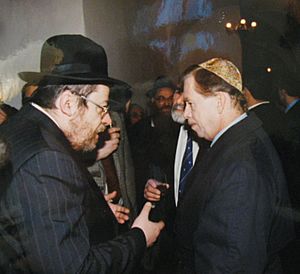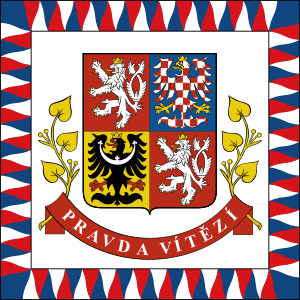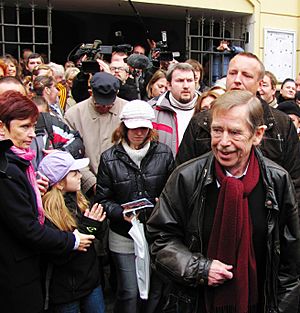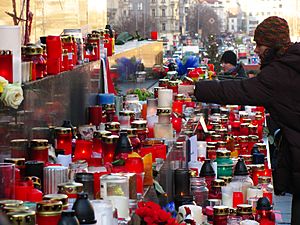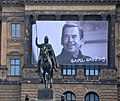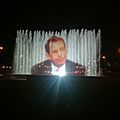Václav Havel facts for kids
Quick facts for kids
Václav Havel
|
|
|---|---|
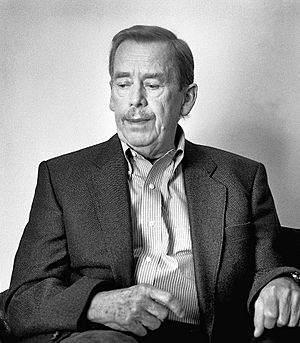 |
|
| 1st President of the Czech Republic | |
| In office 2 February 1993 – 2 February 2003 |
|
| Prime Minister | Václav Klaus Josef Tošovský Miloš Zeman Vladimír Špidla |
| Preceded by | Position established |
| Succeeded by | Václav Klaus |
| 10th President of Czechoslovakia | |
| In office 29 December 1989 – 20 July 1992 |
|
| Prime Minister | Marián Čalfa Jan Stráský |
| Preceded by | Gustáv Husák |
| Succeeded by | Jan Stráský (acting) |
| Personal details | |
| Born | 5 October 1936 Prague, Czechoslovakia (now Czech Republic) |
| Died | 18 December 2011 (aged 75) Hrádeček, Czech Republic |
| Political party | Civic Forum |
| Spouses | Olga Šplíchalová (1964–1996, her death) Dagmar Veškrnová (1997–2011, his death) |
| Alma mater | Czech Technical University in Prague Faculty of Theatre |
| Profession | Playwright |
| Signature | |
| Website | www.vaclavhavel.cz www.vaclavhavel-library.org |
Václav Havel (born 5 October 1936 – died 18 December 2011) was a famous Czech playwright (someone who writes plays), essayist (someone who writes essays), and politician. He was also a dissident, meaning he spoke out against the government.
Havel was the tenth and last President of Czechoslovakia from 1989 to 1992. After Czechoslovakia split, he became the first President of the Czech Republic from 1993 to 2003. He wrote over twenty plays and many non-fiction books. His works were translated into many languages.
From the 1960s, Havel wrote mostly about the politics of Czechoslovakia. After the Prague Spring in 1968, he became more active against the government. In 1977, he became known around the world for his work on Charter 77. This was a human rights manifesto (a public statement of beliefs). He became a leader of the opposition in Czechoslovakia and was even sent to prison for his actions.
In 1989, Havel became president during the "Velvet Revolution". This was a peaceful change in government. As president, he helped Czechoslovakia and later the Czech Republic become open democracies with many political parties. His country changed a lot during his thirteen years as president. The Czech Republic separated from Slovakia, even though Havel did not want this to happen. The Czech Republic also joined NATO and started working to join the European Union. The country became a member of the EU in 2004. Havel was one of the first people to sign the Prague Declaration on European Conscience and Communism.
Contents
Growing Up in Prague
Václav Havel was born in Prague, Czechoslovakia, on 5 October 1936. He grew up in a well-known and wealthy family. His family was involved in culture and politics in Czechoslovakia from the 1920s to the 1940s. His father owned part of Barrandov, a high area in Prague. Havel's mother came from a famous family; her father was an ambassador and journalist.
Havel finished his basic schooling in 1951. However, the Communist government did not let him continue formal studies. This was because his family was considered "bourgeois," meaning they were from a wealthy, middle-class background.
In the early 1950s, young Havel started a four-year apprenticeship as a chemical laboratory assistant. He also took evening classes and finished high school in 1954. Colleges with humanities programs would not accept Havel because of his political background. So, he chose to study economics at the Czech Technical University in Prague. He left after two years. In 1964, Havel married Olga Šplíchalová. His mother did not approve of the marriage.
Becoming President
Havel was already a leader of the Civic Forum, a group that pushed for change. On 29 December 1989, he became president. Every member of the Federal Assembly voted for him. This was surprising because Havel had always said he was not interested in politics. He and other dissidents believed that change should come from people directly, not from the government.
Czechoslovakia held free elections in 1990. Havel won and stayed president. Havel wanted to keep the country of Czechs and Slovaks together. He supported keeping the country united even though there was a lot of pressure to split. On 3 July 1992, the federal parliament did not elect Havel again. Slovak members of parliament did not support him. Havel resigned as president on 20 July after the Slovaks declared their independence. He ran for president of the new Czech Republic in 1993. He won and became the first president of this new, separate country.
Havel was quite popular during his time as president. However, some of his actions caused debate. One of his first actions as president was to pardon (forgive) many people. He wanted to reduce the number of people in crowded prisons. He also wanted to release people who had been put in prison unfairly during the Communist era. He believed the previous government's courts had been unfair. Critics said this amnesty (official pardon) led to more crime. In his book, To the Castle and Back, Havel wrote that most people he released had less than a year left in prison.
Havel said that the most important thing he did as president was helping to break up the Warsaw Pact. This was a group of countries that were allied with the Soviet Union. Ending this group was very complex. It took two years for Soviet troops to completely leave Czechoslovakia.
Havel was also very important in changing NATO. He helped change it from a group against the Warsaw Pact to one that includes former Warsaw Pact members. Havel strongly supported expanding this military alliance into Eastern Europe, including the Czech Republic.
Awards and Honors
Václav Havel received many awards for his work. Some of these include:
- The Philadelphia Liberty Medal
- The freedom medal of the Four Freedoms Award
- The Ambassador of Conscience Award
State Awards from Different Countries
Havel was also honored by many countries around the world. Here are some of the state awards he received:
| Country | Awards | Date | Place |
|---|---|---|---|
| Order of the Liberator San Martin Collar | 09/1996 | Buenos Aires | |
| Decoration for Science and Art | 11/2005 | Vienna | |
| Order of the Southern Cross Grand Collar Order of Rio Branco Grand Cross |
10/1990 09/1996 |
Prague Brasília |
|
| Order of Canada Honorary Companion | 03/2004 | Prague | |
| Order of the White Lion 1st Class (Civil Division) with Collar Chain Order of Tomáš Garrigue Masaryk 1st Class |
10/2003 | Prague | |
| Order of the Cross of Terra Mariana The Collar of the Cross | 04/1996 | Tallinn | |
| Légion d'honneur Grand Cross Order of Arts and Letters Commander |
03/1990 02/2001 |
Paris | |
| Order of Merit of the Federal Republic of Germany Special class of the Grand Cross | 05/2000 | Berlin | |
| Order of Merit of Hungary Grand Cross with Chain | 09/2001 | Prague | |
| Gandhi Peace Prize | 08/2003 | Delhi | |
| Order of Merit of the Italian Republic Grand Cross with Cordon | 04/2002 | Rome | |
| Order of Hussein ibn' Ali Collar | 09/1997 | Amman | |
| Order of the Three Stars Grand Cross with Collar | 08/1999 | Prague | |
| Order of Vytautas the Great Grand Cross | 09/1999 | Prague | |
| Order of the White Eagle | 10/1993 | Warsaw | |
| Order of Liberty Grand Collar | 12/1990 | Lisbon | |
| Order of Brilliant Star with Special Grand Cordon | 11/2004 | Taipei | |
| Order of the White Double Cross | 01/2003 | Bratislava | |
| The Golden honorary Medal of Freedom | 11/1993 | Ljubljana | |
| Order of Isabella the Catholic Grand Cross with Collar | 07/1995 | Prague | |
| National Decoration of Republic of Turkey | 10/2000 | Ankara | |
| Order of Yaroslav the Wise | 10/2006 | Prague | |
| Order of the Bath Knight Grand Cross (Civil Division) | 03/1996 | Prague | |
| Presidential Medal of Freedom | 07/2003 | Washington D.C. | |
| Medal of the Republic | 09/1996 | Montevideo |
His Writings
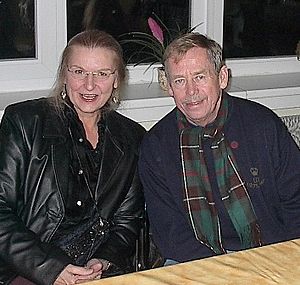
Václav Havel was a talented writer. He wrote many different kinds of works, including poetry, plays, and non-fiction books.
Collections of Poetry
- Čtyři rané básně
- Záchvěvy I & II, 1954
- První úpisy, 1955
- Prostory a časy (poesie), 1956
- Na okraji jara (cyklus básní), 1956
- Anticodes, (Antikódy)
Plays He Wrote
- Motormorphosis 1960
- An Evening with the Family, 1960, (Rodinný večer)
- The Garden Party (Zahradní slavnost), 1963
- The Memorandum, 1965, (Vyrozumění)
- The Increased Difficulty of Concentration, 1968, (Ztížená možnost soustředění)
- Butterfly on the Antenna, 1968, (Motýl na anténě)
- Guardian Angel, 1968, (Strážný anděl)
- Conspirators, 1971, (Spiklenci)
- The Beggar's Opera, 1975, (Žebrácká opera)
- Unveiling, 1975, (Vernisáž)
- Audience, 1975, (Audience) - a Vanӗk play
- Mountain Hotel 1976, (Horský hotel)
- Protest, 1978, (Protest) - a Vanӗk play
- Mistake, 1983, (Chyba) - a Vanӗk play
- Largo desolato 1984, (Largo desolato)
- Temptation, 1985, (Pokoušení)
- Redevelopment, 1987, (Asanace)
- Tomorrow, 1988, (Zítra to spustíme)
- Leaving (Odcházení), 2007
Non-Fiction Books
- The Power of the Powerless (1985) [Includes 1978 titular essay.]
- Living in Truth (1986)
- Letters to Olga (Dopisy Olze) (1988)
- Disturbing the Peace (1991)
- Open Letters (1991)
- Summer Meditations (1992/93)
- Towards a Civil Society (Letní přemítání) (1994)
- The Art of the Impossible (1998)
- To the Castle and Back (2007)
Images for kids
-
Havel embraces the former communist leader Alexander Dubček at a meeting in the Laterna Magika theatre in Prague on 24 November 1989
-
Havel, along with Bill Clinton, King Juan Carlos I of Spain and Simone Veil in 2000
-
A large tapestry of Václav Havel with the caption Havel Forever was unveiled on Wenceslas Square on 17 November 2014, the 25th anniversary of the Velvet Revolution.
-
Václav Havel photograph on the fountain in Zagreb, Croatia
See also
 In Spanish: Václav Havel para niños
In Spanish: Václav Havel para niños


